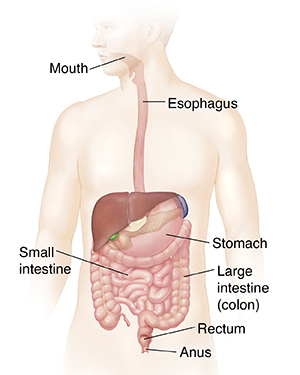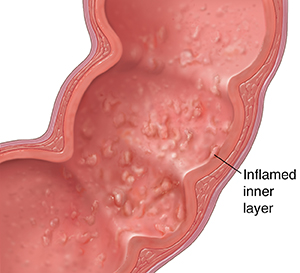What is Ulcerative Colitis?
Ulcerative colitis is a long-term (chronic) disease. It causes swelling (inflammation) and sores (ulcers) in the inner lining of the rectum and colon. It is a form of inflammatory bowel disease (IBD). It is unclear what causes it, but symptoms can be managed. People with this disease can lead full, active lives.

 |
| Ulcerative colitis affects the inside layers of the rectum and colon. |
Symptoms of ulcerative colitis
Symptoms often have to do with bowel movements. You may have:
-
Frequent, loose bowel movements
-
Blood and pus in stools, or rectal bleeding
-
Feeling that you didn’t fully empty your bowels (incomplete bowel movement)
-
Feeling that you need to have a bowel movement right away (urgency)
-
Belly (abdominal) cramps
-
Loss of appetite, weight loss
-
Nausea
-
Feeling very tired (fatigue)
-
Anemia
-
Joint pain
-
Rectal pain that comes and goes
-
Eye pain or redness
-
Certain rashes
How is ulcerative colitis diagnosed?
Your healthcare provider will ask about your past health and family history. They will also give you a physical exam. You may also need these tests:
-
Lab tests. Your blood and stool will be checked.
-
Colonoscopy of the large intestine. This test is the most accurate way to diagnose this condition. A healthcare provider uses a long, flexible tube with a tiny light and camera on one end to check the inside of your large intestine.
-
Imaging tests. These include X-ray, CT scan, or MRI scan.
How is ulcerative colitis treated?
Medicines
Your healthcare provider will try to find the medicines that work best for you. You may take:
-
A type of anti-inflammatory medicine (called 5-ASA compounds or mesalamine) to help reduce swelling and inflammation in the intestines
-
Corticosteroids to help reduce inflammation
-
Antibiotics to fight bacteria, if there is an infection
-
Medicines to control your body’s immune system (such as immunomodulators or biologics)
Lifestyle changes
Certain foods can make your symptoms worse. You may need to change what you eat. Stay away from any food that makes your symptoms worse. These foods vary from person to person. But certain foods cause symptoms in many people. These include high-fiber foods (such as fresh vegetables) and high-fat foods (such as dairy products and red meat). Keep track of foods that cause you problems. Food sensitivity testing and supplements to help repair the intestinal lining may also be beneficial.
Stress can also worsen symptoms. Reducing stress may help. Methods like relaxation exercises, meditation, and deep breathing can help you control stress. Your healthcare provider may be able to tell you more about these.
If surgery is needed
Surgery may help control or even cure ulcerative colitis. It is done to take out a severely affected part of the colon. If this is an option for you, your healthcare provider can tell you more.
Online Medical Reviewer:
Marianne Fraser MSN RN
Online Medical Reviewer:
Rita Sather RN
Online Medical Reviewer:
Robyn Zercher FNP
Date Last Reviewed:
3/1/2024
© 2000-2025 The StayWell Company, LLC. All rights reserved. This information is not intended as a substitute for professional medical care. Always follow your healthcare professional's instructions.